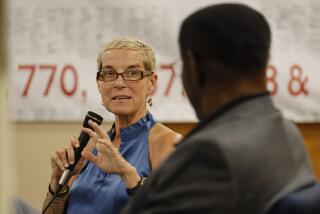Questions, Questions : Touring Soviet Scholar Engulfed by Californians’ Curiosity
- Share via
Nina Belyaeva, a Soviet legal scholar on a speaking tour of Southern California, took the rostrum at the UC Irvine University Club and confessed that she did not know where to begin.
“I am asked an endless number of questions,” she said in rapid, near perfect English. “All about what is happening in the Soviet Union.”
A few years ago, Belyaeva might have opened her speech by saying she was afraid to begin. But under the more liberal glasnost (openness) policies of Soviet leader Mikhail S. Gorbachev, Belyaeva’s biggest problem was satisfying the enormous curiosity of her American audiences.
‘Really Surprised’
In the 10 days she spent shuttling frantically from one question-and-answer session to the next, she had been asked whether Gorbachev was really to be trusted, whether anyone was capable of changing the Soviet political system, whether Soviet professional women were paid equally to men and finally, how she had ever learned to speak such good English.
“People are really surprised,” she said of her visit. “They say, ‘Oh, you are a Muscovite, a real Muscovite.’ They want to touch me.”
Belyaeva, 31, came to the United States to attend a meeting of The International Foundation for the Survival and Development of Humanity, a peace group whose board of directors includes such well-known personalities as American industrialist Armand Hammer and Andrei D. Sakharov, the dissident Soviet nuclear scientist who made national headlines two weeks ago when he was allowed to visit the United States for the first time. Sakharov appointed Belyaeva to the group’s human rights commission because of her legal expertise.
Like Sakharov, this was Belyaeva’s first visit to the United States. But unlike him, she does not call herself a dissident. Rather, she sees her role as a professional who can change her country’s legal system from within.
Belyaeva has spent the past few years encouraging Soviet voluntary organizations, such as artistic and agricultural unions, to obtain legal status similar to that of an American nonprofit group. Although such groups supposedly had the right to do so under the Soviet constitution, few tried until Gorbachev changed the political atmosphere and encouraged such groups to form.
“What is going on now, it could have been done much earlier,” she said this week after her speech at UCI. But Soviet citizens “got used to having official approval for change, because most of the people were brought up under Stalin and Brezhnev when most of the decisions were made from above.”
Belyaeva, a practicing attorney who has helped Soviet groups obtain legal status, said, “I didn’t feel that I was doing something abnormal. As a doctor helps everyone who is sick, a lawyer helps everyone who needs legal help.”
Belyaeva admitted, however, that her work in the Soviet Union could cause her “difficulties” with the authorities. But, she said, she is unafraid because “times have changed very much and no one is supposed to be in prison.”
Meets Public
After she finished answering questions at UCI, she mingled with members of the audience. One of them was Rein Taagepera, a UCI professor who left his native Estonia in 1944.
Estonia was taken over by the Soviet Union in 1940 and renamed the Estonian Soviet Socialist Republic. It has recently been shaken by a wave of popular unrest and calls for independence.
Belyaeva and Taagepera chatted about American media coverage of the unrest, and he promised to send her dissident Estonian newspapers published in the United States.
“Her coming here is something that couldn’t ever happen a year ago,” he said, adding that just that morning he had been interviewed for the first time on the official Soviet Estonian radio.
Taagepera revisited his homeland for the first time last year. After the trip, he said, “I made a rule to myself: Expect the unexpected. And (Belyaeva’s visit) is an example of that.”
More to Read
Sign up for Essential California
The most important California stories and recommendations in your inbox every morning.
You may occasionally receive promotional content from the Los Angeles Times.










